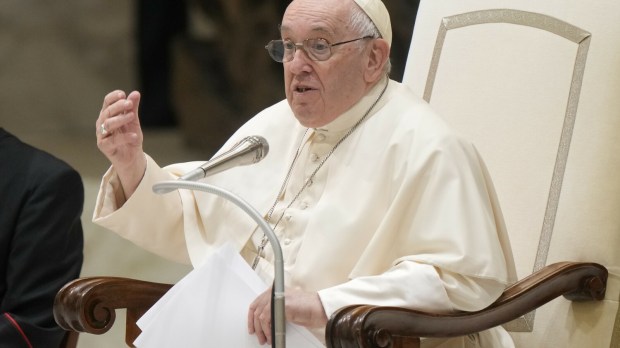“There is an urgent need to initiate a process leading to an effective, stable, and organic synergy between academic institutions,” Pope Francis told representatives of Rome’s 22 pontifical academic institutions in an audience on February 25, 2023.
Paul VI Hall was filled with students and professors who had come to hear the Pope speak. He invited them to “take note” of the fact that the “multiplicity” of study centers in Rome, which developed over the centuries, now risks “wasting precious energy.” This could thus threaten to “slow down” the transmission of the “evangelical joy of study.”
The Pontiff stressed the “reduction in economic and human resources” that these institutions suffer. He also emphasized how the pandemic has affected these educational establishments, which are mostly attended by international students.
The Pope invited the universities and pontifical institutes to face these difficulties not in a “defensive” way, but by considering them as “a new impetus towards the future.”
He warned them against being “too self-referential,” but also encouraged them to launch a process of reform by considering “courageous and, if necessary, unprecedented developments.” Let’s “not argue between ourselves to take a student or an hour more,” he said.
Pope Francis announced that the Dicastery for Culture and Education, whose prefect is Portuguese Cardinal José Tolentino de Mendonça, would be the architect of this upcoming reform.
He ended his speech with the image of Christ as a “choirmaster,” whose hands direct the whole of humanity and at the same time each individual. He encouraged pontifical academic institutions not to act as “soloists” but to “sing as a choir” by cultivating harmony.
A first joint report on the pontifical institutions in Rome
The meeting was an opportunity for the institutions’ rectors to submit their first joint report, which covers the 2021-2022 academic year. The evaluation, which was presented at a press conference on February 24, was made in light of the 5th anniversary of Pope Francis’ Apostolic Constitution, Veritatis Gaudium (2018), in which he had reformed the pontifical academic institutions.
The Pontiff had focused his reform on four objectives: transdisciplinarity, the creation of networks to find concrete answers to humanity’s problems, a return to the kerygmatic source of Christian teaching, and a development of community experience geared towards the “joy of truth.”
The numbers
The 22 pontifical academic institutions included in the report are divided into four categories: universities (7), faculties (4), athenaeums (2) and institutes (9). They were founded between 1551 and 1981, and 15 of them are entrusted to Church institutions. For example, the Jesuits administer the “Gregorian” University and the Dominicans the “Angelicum” University.
In all, 15,634 students studied in Rome in 2021-2022. They represent 8% of the students in the Eternal City, including considering public and private universities and colleges. There are 2,056 professors who teach in these universities, meaning there is a very high professor-student ratio: about 1 professor for every 6 students on average. These institutions also operate thanks to the work of 459 employees in the administrative sector.
These institutions are also very international: On average, there is one Italian student for every eight non-Italian students, the latter coming from 124 countries across the world and from all continents. The Roman institutions are affiliated with 221 other institutions around the globe.
The most popular discipline studied is theology (22.1% of students), which is offered in 15 out of the 22 Roman institutions, followed by philosophy (13.2%) and canon law (7.4%). These establishments offer courses in nearly 30 different subjects (see chart below). In all, 3,086 degrees were awarded in 2021-2022.
Pontifical academic institutions are monitored by the Holy See’s Agency for the Evaluation and Promotion of the Quality of Ecclesiastical Universities and Faculties, a body created by Benedict XVI in 2007.
Below is a brief presentation of the 22 institutions.

